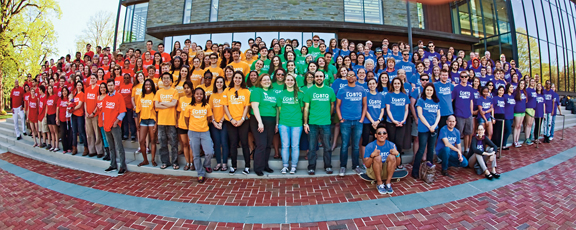By Margie Peterson
In May 2013, about 450 Lafayette students, faculty, and staff turned out on campus for a rally for equality for people who identify as lesbian, gay, bi-sexual, transgender, or queer. A photo of the crowd dressed in colorful T-shirts arranged to create a living rainbow flag in front of Skillman Library appeared the next day on the College’s website and Facebook page.

On May 1, 2013, students, faculty, and staff donned T-shirts in a rainbow of colors to kick off the College’s first LBGTQ Equality Rally. The event, held on the Quad, featured performances, readings, and an open mic.
“You saw this sea of people in bright colored T-shirts,” says Gene Kelly, associate dean of intercultural development and director of gender and sexuality programs. “I felt nothing but pride in the fact that the campus community was willing to not just stand up because it was convenient but because it was important.”
That rally is indicative of the efforts Lafayette has made to ensure people in the LGBTQ community feel welcome and supported, according to Kelly, who was hired in July 2012 to aid in that mission.
At Saturday’s Reunion College program “Creating a Supportive Campus Climate: The Lafayette College Safe Zone Program,” Kelly told about 15 alumni and their partners and friends about such efforts, including Safe Zone, which provides training for students, faculty, and staff seeking to be part of that supportive environment. A related LGBTQ and ally reception was held later in the day.
Barbara Kerlavage Siegel ’79 of Kennett Square, and Catherine Hanlon ’79 of Brick Township, N.J., say they wish there had been something like Safe Zone when they were attending Lafayette.
Hanlon and Siegel were co-captains of the women’s lacrosse team and best friends, but Siegel didn’t learn Hanlon was a lesbian until after they graduated.
Hanlon says there was hostility to gays and lesbians at the time, and she felt she couldn’t talk to any of her friends, coaches, or professors about her sexual orientation.
“I wish I had been able to offer more support,” Siegel says. They have stayed friends and their friendship influenced Siegel’s own belief in LGBTQ equality.
Hanlon told Kelly she would be willing to come talk to students about her experiences. This offer resonates well with the beginning discussions of forming an LGBTQ alumni affinity group.
Frank Hermann ’59 and Rich Hauser ’64 said when they were students they didn’t know anyone who identified as homosexual in what was then an all-male student body. Hermann of Las Vegas and Hauser of San Francisco said they were unsure of their own sexual orientation at the time and didn’t come out until much later.
“I didn’t detect any homophobia here; it was just the way it was,” Hauser says.
Hermann, an engineer, said he was fired from his job with the Federal Aviation Administration in 1969 because he admitted to being gay, but got a good job immediately and became active in the Gay Rights movement.
Hermann and Hauser were heartened that there are gay students at Lafayette who are out and clearly comfortable with their sexual identity and acceptance on campus.
“From what I’m seeing from the younger kids, they are so far ahead,” Hermann says.
Indeed, the campus has made great strides, says Elizabeth “Libby” Lucy ’15, one of the 350 Safe Zone graduates. “Over the past two years the impact Gene Kelly has had on campus is huge. He says there’s an out member of every fraternity, and it’s because accepting the LGBTQ community is now thought of as such a positive move to make on campus.”
A member of the men’s tennis team came out during his first year. The Lafayette published an interview with him in the Feb. 21, 2014 issue.
“One of the goals is about increasing awareness of one’s own internal biases about issues of sexual and gender identity,” Kelly says. “And increasing their knowledge about issues that affect LGBTQ people, particularly at Lafayette.”
Those who complete the training receive a placard to display in their rooms or offices.
Safe Zone is the educational component of a much broader effort that includes several discussion groups that meet throughout the year, the Social Justice Institute, celebrations such as LGBT History Month and National Coming Out Day—all within the mission of increasing the understanding and appreciation of how gender and sexuality influence and frame our daily lives and social interactions.
“I can’t control any of your beliefs in this room, or of those I’m working with,” Kelly said. “But if you’re going to be a student or faculty or a staff member at this institution, you are required by our policy to treat everybody in the place with respect. If you can’t do that, you need to change or you need to leave.”
